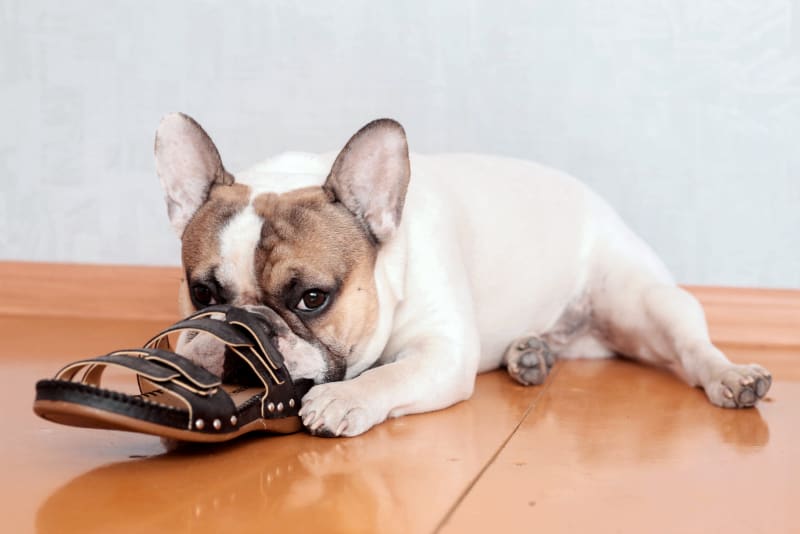Causes of Destructive Chewing in Dogs
Although chewing is normal for dogs, most pet owners would prefer not to sacrifice their favorite pair of shoes or a brand new throw pillow.
For puppies, chewing can help them to relieve teething pain. Whereas, for adult dogs, chewing can help to keep their teeth clean and their jaws strong.
That said, while chewing is typically a healthy behavior in dogs, if your dog chews excessively and destroys your things there may be an underlying issue, such as those listed below.
Puppy Teething
Puppies, like human babies, lose their baby teeth and experience pain and discomfort as their adult teeth come in. While going through the teething process, your puppy may chew to help relieve some of the discomfort associated with the adult teeth coming in.
Anxiety & Stress
Dogs are highly social animals that love to spend time with their people. Which is why many dogs suffer from separation anxiety while their people are away. For these dogs, chewing can be a comforting activity.
Boredom
Dogs that are left without mental stimulation for long periods of time will become bored. Bored dogs will typically sniff around the house looking for interesting objects to chew on as a way to pass the time.
Hunger
Dogs on calorie-restricted diets may chew on objects in an effort to find another sources of nutrition and satiate hunger. If your dog is chewing on food related objects such as garbage, packaging, or kitchen cupboard doors, hunger may be the underlying issue.
How to Redirect Chewing
To curb destructive chewing, it's important to first identify the underlying issue and work on eliminating any of the problems listed above. Then, you will be able to focus on redirecting your dog's chewing to more appropriate objects such as chew toys and bones.
Exercise
Typically, a tired dog is a well behaved dog. Your first line of defense against destructive chewing is making sure that your dog gets plenty of exercise each day before you leave the house. How much exercise your dog needs depends largely on your dog's breed and age. High energy German Shepherds require a minimum of two hours of exercise a day, whereas small dogs such as Pomeranians may be content with as little as 40 minutes of exercise each day. Ask your vet how much physical activity is appropriate for your dog.
Entertainment
One way to help reduce separation anxiety and prevent boredom chewing is to provide your dog with a puzzle toy stuffed with food, (or a hard wearing soft toy if your dog suffers from separation anxiety), whenever you leave the house. Only allow your dog to play with these special toys while you are out of the house. This will help to retain the novelty of the toy and keep your dog interested.
By providing your dog with interesting toys each time you leave the house, you will not only create a positive association with alone time, but the toys will also serve as a distraction from tempting objects that you do not want your dog chewing on.
When choosing a toy for your dog consult your veterinarian. Not all dog toys are appropriate for unsupervised use.
Dog Proofing
While you are working on the other points, ensure that your dog only chews designated objects like toys, by removing all other temptations out of your dog's reach. Be sure to put valuable objects out of reach, your laundry away or in a hamper, books on high shelves, and children's toys away in closets or drawers.
Discourage Unwanted Chewing
If you encounter your dog chewing on an item they shouldn't be, say "no," take it away, and provide a replacement item that they are allowed to chew on. When you notice your dog chewing on a chew-toy that you have provided, praise your dog for their good behavior
If your dog is a particularly determined chewer, you may want to try spraying objects you don't want your dog to chew with a dog deterrent spray.
If you are struggling to manage your dog's chewing, our team of veterinary professionals can help. Contact our Bartlett vets today for a consultation.

Looking for a vet in Memphis?
We're always accepting new patients, so contact our veterinary hospital today to book your pet's first appointment.Related Articles View All
Heimlich Maneuver For Dogs: What To Do If My Dog Is Choking
What should you do if something gets lodged in your dog's throat and they begin to choke? Here, you will find helpful information on the Heimlich maneuver for dogs and what to do if your dog is choking.
Signs That Your Dog May Have a Cavity
Can dogs get cavities? What are the signs of cavities in dogs? In today's post, you will find the answers to these dog cavity questions and more.
Chipped Tooth in Dogs - What to Do if Your Dog Has a Broken Tooth
Dogs often experience chipped or fractured teeth. Is a broken dog tooth an emergency? It might be. Today's post contains information about broken teeth in dogs and what to do about dog tooth fractures.
Large Dog Care & Saving Money with Wellness Plans
What do large and giant breed dogs need to stay healthy and happy? Here, we provide vital information on how to proactively care for your giant or large dog's health and save money along the way.
